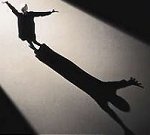On this page: THE LAST LETTER | LOVE LIZA | RUSSIAN ARK | SHANGHAI PANIC
< < M O R E | M O R E > > Back to the SHADOWS FILM FEST page FESTIVAL SHORTS last update 7.Nov.02
 THE LAST LETTER [La Derniθre Lettre]
THE LAST LETTER [La Derniθre Lettre]
|
|
dir Frederick Wiseman; scr Veronique Aubouy with Catherine Samie release UK Nov 02 lff; US Apr.03 02/France 1h01 
|
 The thing that I don't get is this: Why was this film made? It consists of a Ukrainian woman reciting the last letter she ever wrote to her son, just before the occupying Germans marched her Jewish community out of the ghetto to their deaths. She talks about how she never really thought of herself as Jewish until now--she was Russian after all--but she has gained a respect for her Jewishness and what it means. She talks about how different people treat each other differently in times of tension. She talks about hope and mortality. She tells the story of the Nazi occupation, the dividing into ethnic groups, the move to the ghetto, life there, rumours of what was to come.
The thing that I don't get is this: Why was this film made? It consists of a Ukrainian woman reciting the last letter she ever wrote to her son, just before the occupying Germans marched her Jewish community out of the ghetto to their deaths. She talks about how she never really thought of herself as Jewish until now--she was Russian after all--but she has gained a respect for her Jewishness and what it means. She talks about how different people treat each other differently in times of tension. She talks about hope and mortality. She tells the story of the Nazi occupation, the dividing into ethnic groups, the move to the ghetto, life there, rumours of what was to come.And yet even with all the passion in the subject matter, this film seems to demean it. Perhaps if this was an actual letter it would be a compelling historical document. But no, it's taken from Vassili Grossman's novel Life and Fate. So it's very, very dramatic, dragging out the final goodbye endlessly, while relentlessly manipulating the audience. Meanwhile Wiseman films everything in 1940s-style black and white--a black limbo with the old woman standing in it, gesturing wildly (it's performance art not acting), while the camera keeps cutting to the shadows on the wall, as if that means something profound. There's a long mumbly-song interlude at one point. This gimmicky, pretentious artificiality makes it impossible to engage in any meaningful way. Since it's fiction, why bother to do this at all? These things have been said with much more power by the real people themselves. And finally, why is it in French? Not only does this make no sense, it's the final element that removes us completely from the subject matter. And that's a real shame. [themes] 29.Oct.02 lff
 LOVE LIZA
LOVE LIZA
|
|
dir Todd Louiso scr Gordy Hoffman with Philip Seymour Hoffman, Kathy Bates, Jack Kehler, Sarah Koskoff, Stephen Tobolowsky, Shannon Holt, JD Walsh, Erika Alexander, Kevin Breznahan, Jennifer Kaddy, Jimmy Raskin, Ann Morgan release US 3.Jan.03; UK 31.Jan.03 02/US 1h30 
|
 Actor Louiso (High Fidelity) turns director for this award-winning but belaboured examination of grief. Wilson (Hoffman, whose brother wrote the script) is understandably shattered when his wife commits suicide, so much so that he sleeps on his living room floor, refuses to read the suicide note and lets his work for a web design firm slip badly. He finds it impossible to communicate with anyone, least of all his mother-in-law (Bates), who is herself struggling badly, also understandably! A concerned colleague (Koskoff) suggests that Wilson spend time with her model-racer brother (Kehler) as a kind of therapy, and Wilson's initial keenness suggests this may be helping. He gets a prestigious new job for a wealthy client (Toblowsky) ... but his increasing addiction to petrol fumes threatens everything.
Actor Louiso (High Fidelity) turns director for this award-winning but belaboured examination of grief. Wilson (Hoffman, whose brother wrote the script) is understandably shattered when his wife commits suicide, so much so that he sleeps on his living room floor, refuses to read the suicide note and lets his work for a web design firm slip badly. He finds it impossible to communicate with anyone, least of all his mother-in-law (Bates), who is herself struggling badly, also understandably! A concerned colleague (Koskoff) suggests that Wilson spend time with her model-racer brother (Kehler) as a kind of therapy, and Wilson's initial keenness suggests this may be helping. He gets a prestigious new job for a wealthy client (Toblowsky) ... but his increasing addiction to petrol fumes threatens everything.The film opens in the shattered silence of grief and pretty much stays there for 90 minutes. This quiet awkwardness is startlingly real, and painful to watch, especially with such a fine actor as Hoffman on screen, fully inhabiting the role. As Wilson gets deeper and deeper into his nightmare, becoming increasingly helpless to sort himself out, the film does find a real resonance. And yet, it continually refuses to go anywhere! Sure there are moments of sharp humour and anger, confusion and insight. But as Wilson becomes more like a spoiled child unwilling (rather than just unable) to cope, the film starts to grate. His mental imbalance becomes more than a little scary, and yet it never tips over the edge. There are also a few underexplained gaps in the story, especially in the interplay between Hoffman and Bates (who's also superb). Louiso's direction is clever and revealing, and Gordy Hoffman's script captures some difficult truths. But in their raw examination of grief and pain the filmmakers forgot that this is a movie--it needs to tell us something we don't already know. It needs to go somewhere, to stop wallowing and get on with the story. [15 themes, language] 31.Oct.02 lff
 RUSSIAN ARK
RUSSIAN ARK
|
|
dir Aleksandr Sokurov scr Boris Khaimsky, Anatoli Nikiforov, Svetlana Proskurina, Aleksandr Sokurov with Sergei Dreiden, Leonid Mozgovoy, Maksim Sergeyev, Mariya Kuznetsova, Natalya Nikulenko, Vladimir Baranov, Yuli Zhurin, David Giorgobiani, Aleksandr Chaban, Mikhail Piotrovsky, Artyom Strelnikov, Alla Osipenko release US 18.Oct.02; UK 4.Apr.03 02/Russia 1h36 
|
 Sokurov's extremely ambitious film is the longest Steadicam shot ever--one single take for more than 90 minutes. The logistical accomplishment is astonishing, even if the film itself is rather impenetrable. There's a sort of story here as an unseen man is mysteriously transported through time and space to the Hermitage in St Petersburg, the depository (or "ark") for Russian history and culture. As he wanders unseen through the corridors, he encounters people and events from various points in Russian history, from Peter the Great to Nicolas II, musicians, politicians, poets and even visitors to the modern-day museum. He's accompanied on this voyage by a strange foreigner (Dreiden) who interacts with some of the people.
Sokurov's extremely ambitious film is the longest Steadicam shot ever--one single take for more than 90 minutes. The logistical accomplishment is astonishing, even if the film itself is rather impenetrable. There's a sort of story here as an unseen man is mysteriously transported through time and space to the Hermitage in St Petersburg, the depository (or "ark") for Russian history and culture. As he wanders unseen through the corridors, he encounters people and events from various points in Russian history, from Peter the Great to Nicolas II, musicians, politicians, poets and even visitors to the modern-day museum. He's accompanied on this voyage by a strange foreigner (Dreiden) who interacts with some of the people.All of this is staged with amazing precision, especially considering that there are no cuts whatsoever in the whole film. The amazing technical achievement is somewhat weakened by the dull HD image quality--colours are rather muted, as is the thin light coming in from the heavy winter sky outside. But still, the palace itself is spectacular and the set decorators and costumers have exceeded themselves creating the atmosphere, including a detailed theatrical performance, an ornate and complex court scene (with a timely punchline about finding peace even after the most awful clash between nations), and a massive ballroom sequence featuring a full orchestra and a cast of thousands waltzing away in their finery. Even so, it's pretty hard going. Without a thorough understanding of Russian history and European art the various references and images make little sense. It jumps around in time, which is hard to follow, and has an overwhelmingly ponderous tone, like the narrator is sleepwalking aimlessly through a dream. I'm sure it's full of layers of meaning, but it's not easy to get it all. On the other hand, anyone can sit back and enjoy the logistical, artistic and technical skills on display. [U some themes] 4.Nov.02 lff
 SHANGHAI PANIC
SHANGHAI PANIC
|
|
dir-scr Andrew YS Cheng with Mian Mian, Li Zhinan, Yang Yuting, He Weiyan, Zhou Zhijie, Zhou Liang, Wang Shiyuan release UK Nov 02 lff 01/China 1h27 
|
 Essentially a Chinese Dogme film, this was made with a handheld DV camera and probably smuggled out of the country past the censors. It follows a group of young people who could be in any city on earth with their nihilistic view of the future. At the centre is Bei, a young man who thinks he has Aids and sends his group of friends into a panic. They haven't a clue what might happen if he's positive, so they contemplate their mortality, considering suicide and using lots of drugs and alcohol to forget about it all. Bei's friends are all around 20 and they are all part of a dance club: Fifi (played by Mian Mian, who wrote the novel the film is loosely based on) lives off money she gets from her boyfriends; Kika is a banned author who has left her husband and baby daughter; Casper is a lesbian tomboy with a professional knowledge of pharmaceuticals; and Bei has had a crush on his friend Jie for seven years, but he's never had the nerve to say anything about.
Essentially a Chinese Dogme film, this was made with a handheld DV camera and probably smuggled out of the country past the censors. It follows a group of young people who could be in any city on earth with their nihilistic view of the future. At the centre is Bei, a young man who thinks he has Aids and sends his group of friends into a panic. They haven't a clue what might happen if he's positive, so they contemplate their mortality, considering suicide and using lots of drugs and alcohol to forget about it all. Bei's friends are all around 20 and they are all part of a dance club: Fifi (played by Mian Mian, who wrote the novel the film is loosely based on) lives off money she gets from her boyfriends; Kika is a banned author who has left her husband and baby daughter; Casper is a lesbian tomboy with a professional knowledge of pharmaceuticals; and Bei has had a crush on his friend Jie for seven years, but he's never had the nerve to say anything about.This is guerrilla filmmaking, and if it had come from anywhere besides China it would probably be too dull and tedious to ever get screened anywhere. But as it is, it's a startling and important film, showing the state of Chinese society in an intriguing new light--especially the way Western culture has so deeply invaded this once fiercely closed society--shopping malls, disco clubs, Starbucks and teen angst. The film is extremely rambling and aimless, with long scenes that have little or no energy at all as the characters sit around mumbling to each other about everything under the sun (with fairly dodgy English subtitles). It feels like improv--quiet, episodic and fragmented. But all of this adds to the film's underground appeal. It's also very well-filmed, with vibrant colours and a nice use of simple camera effects. There are a few scenes that crackle with internal tension, most notably the extended sequence in which Bei and Jie spend a day alone together in an empty flat, opening up to each other emotionally and physically. And the moral of the film seems to be: Don't have dreams. Which is pretty bleak, but very telling too. [themes, language, drugs, nudity] 30.Oct.02 lff

